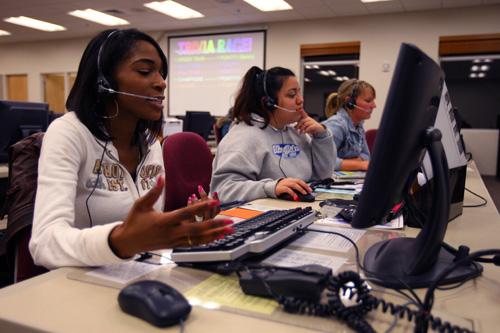University funding affected by economy

Tonisha Daniel, left, sophomore in LAS; Melissa Montoya, center, junior in LAS; and Kaitlin Nolan, sophomore in Business, speak with alumni over the phone about donations Nov. 6. Erica Magda
November 7, 2008
With the decline of the economy, the University is feeling the loss from both private and state funding.
The University’s response to the current economic situation is to do its best to communicate with alumni and University friends about the importance of private support through mailings, telemarketing and face-to-face contact with development officers at University-sponsored events.
“We continue to reach out to our alumni and communicate to them that we understand that we are all in this very difficult economic situation but that we want to stay engaged with our alumni, and we want them to have confidence in our ability to continue to run the University in a good way, and our goal is to come out of this very tough time even stronger,” said Jim Schroeder, vice chancellor for institutional achievement.
The University still communicates with those who are experiencing hard times in the hopes that they will be able to adjust their contribution and continue supporting the University in some way.
Kristen Viscum, a student supervisor at the University of Illinois Foundation and junior in LAS, has noticed the increased leniency in accepting lower pledges than before.
Get The Daily Illini in your inbox!
“We are hearing more hesitancy from people because of the economy and wanting to wait until the end of the year or until they see how their stocks do,” Viscum said.
“But we still make sure that we let them know that the students are extremely dependent on private donations to the University and that any donation helps, no matter how small.”
After each call when a person refuses to make a donation, the telemarketers record the refusal reasons.
As supervisor, one of Viscum’s responsibilities is to review the comments at the end of the day.
“The comments are showing that it is becoming more and more common that people are unable to donate for this particular year because of the economy,” Viscal said.
Not only is the University losing money from donors, but the state is as well.
“The state comes up with a lump sum of money that they will provide to the University, but now the question is, will the state be able to meet its budgeted obligation to support the needs of higher education?” Schroder said.
While the numbers are not yet in for October, previous months offered hope for sufficient donations.
“The first quarter of the fiscal year (July, August and September) compared favorably to that of a year ago, but I will be surprised if this October turns out to compare to last year’s month of October,” said Paul Curnutte, director of the Annual Giving Programs.
Schroeder believes that people still want to support their alma mater and higher education despite these hard times.
“If you go back historically from a philanthropic perspective and look to our recent history where we’ve had recessions or downturns in our market, we have never experienced a decline in philanthropic support in higher education,” he said.
While the University expects to see a decline in annual donors who give between $25 to $1,000, the majority of money the University receives from private donations comes from just 2 percent of those who donate.
Whatever the case, the University is still preparing for the worst.
“We are being very conservative with our budget projections with how much money we have to spend,” Schroeder said.






